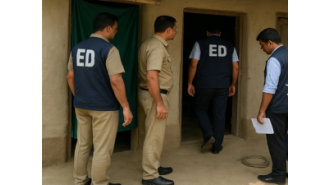How Louisiana Lawmakers Stop Residents’ Efforts to Fight Big Oil and Gas
Louisiana has pioneered ways for other states to discourage environmental protests around “critical infrastructure” projects. Much of it can be traced back to efforts by corporate lobbyists.

As the Bayou Bridge Pipeline was under construction in 2018, Anne White Hat ventured deep into the Atchafalaya Swamp in St. Martin Parish to protest it.
St. Martin is one of 11 parishes crossed by the pipeline, which brings crude oil from Texas to refineries in Louisiana. Though White Hat had permission to be there from some of the more than 100 people who jointly own the tract where she held her protest, she didn’t have permission from all. She was arrested on two felony counts related to trespassing. She posted a $21,000 bond and was released.
Two years later, the district attorney still hasn’t decided whether to proceed with the charges: two counts of unauthorized entry of a critical infrastructure. The maximum penalty is five years in prison, with the possibility of hard labor and a fine of up to $1,000.
“It is intimidating when you’re looking at facing prison in South Louisiana,” she said.
Ironically, a court later found that the pipeline company itself had been trespassing at the time of White Hat’s arrest. The main owner, Energy Transfer Partners, had not obtained easement agreements with all landowners to begin construction, nor had it been granted permission to do so through eminent domain. Its penalty: a $450 fine paid to the landowners.
The judge who set White Hat’s bond at $21,000 was the same judge who imposed Energy Transfer Partners’ fine.“This is yet one more in a long line of examples of how Louisiana laws are first made by oil and gas corporations and then are ignored by the same corporations if they feel like it,” said Bill Quigley, a law professor at Loyola University who is representing White Hat pro bono.
Energy Transfer Partners did not respond to calls and emails seeking comment.
Louisiana has blazed a trail for other states in discouraging environmental protests by raising the legal stakes for those who trespass on or near “critical” oil and gas infrastructure — which includes refineries, chemical plants and ports. In 2004, it was the first state to make that crime a felony.
Louisiana’s pioneering law can be traced to corporate lobbyists. BP and DuPont were among the energy and chemical companies that produced a 2003 guide disseminated to state officials, arguing that enhanced penalties would discourage attacks by terrorists that could cause economic disruptions.
Two years ago, legislators added oil and gas pipelines to the list of infrastructure deemed critical. In White Hat’s view, the entire suite of laws is anti-democratic. “They’re using the state to protect their corporate interests,” she said.
Residents have repeatedly pushed back against pipelines, proposed plants and existing industry in their backyards. While such opposition is almost never monolithic, it is often overwhelming at the local level. But the state’s elected leaders have historically sided with industry, in some cases passing new laws aimed at quelling opposition.
Legislators are trying to reduce local officials’ power to decide whether to exempt industry from local taxes. Years ago, when a local board made up of experts filed an ambitious lawsuit that aimed to hold oil and gas companies accountable for damaging coastal wetlands, state officials undermined it. In another episode, they passed a law that barred communities from using incorporation to collect property taxes from chemical plants. And more than once they have sought to punish student law clinics that represent communities fighting industry.
This year’s legislative session, which begins in March, will again include bills to restrict local input into industrial tax exemptions.
Some of these efforts are part of a larger, coordinated strategy. The three Louisiana lawmakers who sponsored the trespassing bill were members of the American Legislative Exchange Council, a controversial organization that brings lawmakers and corporate lobbyists together to draft “model legislation” that they then shop to other states.
Louisiana’s 2004 trespassing law became just such a template. Fifteen years later, 10 states have similar laws. “Louisiana was a particularly important state,” said Connor Gibson, an investigator with Greenpeace.
The addition of pipelines to the law two years ago came in response to protests that garnered national attention, notably those at Standing Rock in North Dakota, which became the focal point of indigenous protests of the Dakota Access Pipeline. “This just protects against those who want to inhibit commerce,” bill sponsor Rep. Major Thibaut said as he introduced the bill in 2018.
Thibaut, now president of Pointe Coupee Parish, said the law protects workers and would-be protesters from safety concerns on work sites with heavy equipment. When asked whether protesters should be arrested if they don’t interfere with workers, he said, “That’s up to the courts to determine.”
In a prepared statement, Louisiana Mid-Continent Oil and Gas Association President Tyler Gray said the law “does not infringe on an individual’s constitutional rights.”
So far, 15 people have been arrested for violating Louisiana’s new law: 14 protesters and a journalist covering them. Some of them filed a suit in May, claiming the law chills free speech and is thus unconstitutional. The suit is pending.
For decades, an obscure Louisiana board doled out 10-year property tax exemptions to nearly every major manufacturer that was building or expanding a plant in the state.
It was the definition of a rubber stamp. Between 1997 and 2016, the board rejected just eight of the 16,931 applications for relief through the Industrial Tax Exemption Program, for an approval rate of 99.95%, according to an analysis by Together Louisiana, a grassroots organization that has pushed to rein in the program.
That changed when Gov. John Bel Edwards signed an executive order in 2016 that gave local governing bodies affected by the exemptions a say over them for the first time. The breaks can have a big effect on local government’s bottom line.
Since the 2016 executive order, the local agencies that would forgo money on industrial tax exemptions have gotten to vote on them. The East Baton Rouge Parish School Board last year rejected a tax break for an expansion Exxon Mobil had completed two years earlier. That prompted heavy pushback from industry.
Unsuccessful legislation last year would have required parishes to create a single board that votes up or down on the tax breaks, rather than letting the sheriff, the school board and the parish government approve or deny them piecemeal. Explaining his bill, Sen. Bodi White, R-Baton Rouge, said, “I didn’t elect my school board for economic development to bring companies to this state.”
A broad swath of local officials fought to kill White’s bill, including associations of sheriffs, school boards and parish governments. “A parish governing authority should be able to decide whether they can afford to give an exemption and make sure the company getting the exemption is holding up their end of the deal,” said Guy Cormier, executive director of the lobby for parish governments.
A failed bill filed by Rep. Barry Ivey, R-Central, would have gone even further, putting the exemption back in the state’s hands. Ivey, who said manufacturers need more certainty, is already working on a similar bill this year. “I intend to start off where I left off at the end of the 2019 session,” he said.
Despite a recent boom in industrial plants moving to Louisiana, Edwards’ modest reforms were used by his Republican challengers in last year’s gubernatorial race as evidence of the Democrat’s hostility toward industry. Baton Rouge businessman Eddie Rispone — who garnered 49% of the vote in November — made undoing Edwards’ tweaks a major part of his platform.
Edwards, now in his second term, appears to have heard the complaints. He is trying to get local governments, including those in New Orleans and Baton Rouge, to dump new rules that bar exemptions for projects, like Exxon’s, that were completed by the time the break was requested.
As Louisiana’s wetlands vanish, coastal communities have become ever more susceptible to storm surges and sea level rise. And while there are disagreements over how to apportion blame for the erosion, it’s undisputed that oil and gas exploration has played a key role — in part, by dredging 10,000 miles of canals.
And so, in 2013, the board that oversees flood protection in most of metropolitan New Orleans filed an audacious lawsuit that sought to hold 97 oil and gas companies accountable for damaging the region’s natural flood defenses. It set off an immediate firestorm.
The board’s lawsuit quickly earned it rogue status — even though, after the levee failures of Hurricane Katrina, levee board members for the first time were required to have specific qualifications. As a result of those changes, the board that filed the suit was made up of members nominated by professional groups, appointed by Gov. Kathleen Blanco and confirmed by the Senate.
Historian and author John Barry, who was vice president of the board, estimated the Legislature filed 20 separate bills in 2014 to gut the lawsuit. “The Legislature made a very sincere effort to kill the lawsuit after it had already been filed,” he said. “In the end, we defeated all but one piece of legislation.”
The surviving bill, authored by former state Sens. Robert Adley and Bret Allain, retroactively voided the suit. Adley said his beef was that the board didn’t give the proper authorities a heads-up before filing suit. A state judge later found the new law to be unconstitutional, in three different ways.
That wasn’t the end of the assault. Then-Gov. Bobby Jindal, a Republican who opposed the suit, tried to swap out the authority’s board. He replaced four of the nine board members, dumping coastal experts in favor of political appointees. Even then, a narrow majority of the board backed the suit.
Ultimately, the lawsuit was thrown out by U.S. District Judge Nannette Jolivette Brown, who said oil and gas companies had no legal obligation to pay the levee authority for wetland damage, a view upheld by an appeals court. The U.S. Supreme Court refused to hear the case.
Since then, seven coastal parishes, including New Orleans, have filed similar lawsuits against oil and gas companies over land loss in their communities, and Edwards has urged other coastal parishes to follow suit. None of the cases have been decided.
Those who push back against industry in Louisiana often find themselves outmaneuvered.
In 1994, residents of Geismar, in Ascension Parish, were hoping to follow in the footsteps of their upriver neighbors in St. Gabriel by incorporating into a town. The move would give residents more political clout — including the ability to say no to new plants — and bring in tax dollars from nearby industrial facilities.
The late Amos Favorite Sr., who was 71 at the time, was a leading advocate.
“These plants pay a lot of money to Ascension Parish. We (in Geismar) don’t see anything but pollution,” Favorite said in 1994.
But the following year, 11 chemical plants in Ascension Parish filed a lawsuit to quash the incorporation. With that case pending, state Rep. Jerry Luke LeBlanc, a Democrat, sponsored a bill to ban new municipalities from including industrial areas into their boundaries. Then-Gov. Edwin Edwards signed it into law in 1995.
Citing the new law, the court sided with the plants.
The new law meant the planned city would have a much smaller tax base and much less say over the polluters in its midst. Geismar’s drive for incorporation lost steam.
Favorite’s daughter, Malaika Favorite, an artist who still lives in Geismar, said the episode took an emotional toll on her father. “It was really disappointing to him,” she said. “The plants have so much power.”
New laws are hardly the only method Louisiana elected officials have used to stifle residents’ opposition to industry.
In 1997, former Gov. Mike Foster pressured the Louisiana Supreme Court to trim the sails of student law clinics after the Tulane Environmental Law Clinic helped St. James Parish residents fight a polyvinyl chloride plant the chemical giant Shintech wanted to build in Convent.
Foster badly wanted to see the Shintech plant built. He mocked the plant’s two most vocal opponents, Emelda West and Pat Melancon of Convent, as “a bunch of housewives.”
Calls to Shintech seeking comment were not returned.
In addition to challenging Shintech’s air and water permits, Convent residents — with the help of Tulane — filed a complaint with the U.S. Environmental Protection Agency claiming the state violated the landmark 1964 Civil Rights Act when it approved the project.
The complaint became the first key test of an executive order signed by former President Bill Clinton in 1994 that aimed to address the fact that communities of color bore a disproportionate burden of pollution.
Foster was apoplectic. He encouraged Tulane alumni and business leaders to reconsider their financial support for the university.
Several industry lobbying groups, meanwhile, urged the Louisiana Supreme Court, which oversees student law practice in the state, to investigate the law clinic.
Student law practice allows legal novices to gain hands-on experience, while providing legal assistance to those who would not otherwise have access.
The Louisiana Association of Business and Industry, the state’s most powerful business lobby, had recently helped three pro-business justices win seats on the Supreme Court. The chief justice, Pascal Calogero, was up for election the following year.
At LABI’s urging, the court began investigating the Tulane clinic in 1997. As the election heated up, Calogero — and all but one justice — voted to restrict student law assistance. The new rules banned the representation of any community organization affiliated with a national organization — like Greenpeace, the Sierra Club or the NAACP and prohibited students and supervising lawyers from initiating contact with potential clients.
The new rules also placed limits on how much residents could earn and still receive student representation. A family of three, for example, could not get assistance if they made more than $13,650 annually.
The head of the Association of American Law Schools called the new requirements “the most restrictive student practice rule in the nation.”
Ironically, the new rules — which have since been relaxed some — came too late to save Shintech’s plant. The company announced in 1998 it had scratched its plan, opting instead for a much smaller facility in Iberville Parish.
The Tulane clinic has continued to garner the ire of industry over the last two decades. In 2010, Adley introduced another bill aimed at stopping the clinic from going after chemical plants. It would have yanked state funding from Tulane if its law clinic sued a government agency. As the bill was introduced, Dan Borné, then head of Louisiana Chemical Association, said: “My board acted on taking an aggressive approach toward the Tulane Environmental Law Clinic. This is part of that approach.”
But Adley’s bill to defund Tulane was ill-timed. One month earlier, the Deepwater Horizon oil rig exploded in the Gulf of Mexico. Lawmakers were concerned that if the bill passed, residents affected by the spill wouldn’t be able to get legal assistance from Tulane. The bill failed.
Lisa Jordan, director of the clinic, co-wrote the civil rights petition to the EPA on behalf of Convent residents two decades ago. Even though the case put a crimp on the clinic, she’s proud of taking on the fight. “It was hard, and it had a really good result for the clients,” she said. “And because it told me this is such important work, even when you don’t necessarily succeed ... to give people a legal voice that they otherwise couldn’t have had.”
Monique Harden, of the Deep South Center for Environmental Justice who co-wrote the civil rights petition, said the repeated assaults on the clinic exemplify how Louisiana officials tend to react to environmental uprisings.
“There is this systemwide hostility to people fighting back,” Harden said. “They want to cut support. But not just cut support, cut your remedy.”
Do you live in one of these affected parishes? Share your story with us. ProPublica and The Times-Picayune and The Advocate are investigating the massive chemical plants in the industrial stretch between New Orleans and Baton Rouge, and hearing from you will help us tell more stories.
Talk to us if:
Here’s how to talk to us:






